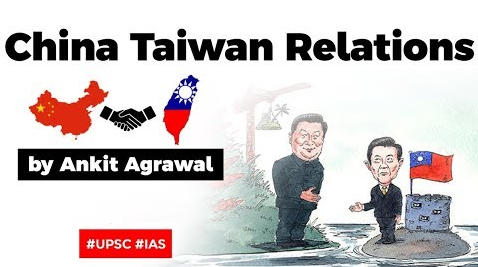Table of Contents

ROC VS PRC
- Taiwan, officially known as the Republic of China (ROC).
- It is an island off the southern coast of China.
- It has been governed independently from mainland China since 1949.
- The People’s Republic of China (PRC) views the island as a province.
HISTORY OF TAIWAN
- Ethnic Han Chinese settlers, primarily merchants, began to arrive in Taiwan in the 17th century.
- The island, now inhabited by a Han Chinese majority, many of whom identify as distinctly Taiwanese.
- The indigenous peoples account for only around 2% of the population.

- Taiwan was annexed by the Qing dynasty in the late 1600s.
- It was later ceded to Japan in 1895 by imperial China in accordance with a treaty of Sino-Japanese War.
- Japan governed it as a colony until 1945, after it lost to ROC military forces.
CIVIL WAR
- China’s nationalist government (KMT) was defeated in a civil war by the communists in 1949.
- The KMT government (ROC) had been exiled to Taiwan.
- KMT, insisted his government continued to represent all Chinese people on both the island and the mainland.
- Washington and most Western powers affirmed the ROC’s stance.

TAIWAN REPRESENTATION IN UN
- Washington’s position began to shift under the Nixon administration.
- The ROC lost its seat representing China at the United Nations in 1971 to Beijing.
- Since 1971, the PRC replaced the Republic of China.
- Washington formally recognised PRC in 1979.
‘ONE CHINA’ PRINCIPLE
- Beijing and Taipei sharply disagree on the island’s status.
- The PRC asserts that there is only “one China” and that Taiwan is an inalienable part of it.
- Beijing says Taiwan is bound by an understanding reached in 1992.
- An agreement was reached b/w Chinese Communist Party (CCP) and the Kuomintang (KMT) in 1992 known as “Consensus”.
- It states that there is only “one China” but allows for differing interpretations.
- The tacit agreement underlying the 1992 Consensus is that Taiwan will not seek independence.


- However, the island’s current president, Tsai Ing-wen, leader of the Democratic Progressive Party (DPP)- Rejected the consensus.
- In a January 2019 speech, she declared the “one country, two systems” framework advanced by Beijing unacceptable.
Latest Burning Issues | Free PDF






















 WhatsApp
WhatsApp